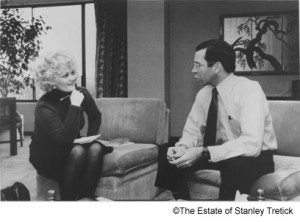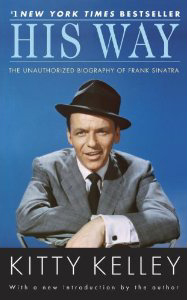Posts Tagged ‘Frank Sinatra’
Frank Sinatra Centennial "His Way"

A new edition of Kitty Kelley’s His Way: The Unauthorized Biography of Frank Sinatra has been released for Frank Sinatra’s 100th birthday, December 12, 2015. This edition has a new Afterword. The re-release was celebrated with a book signing at i Ricchi in Georgetown in D.C. for the benefit of Reading Is Fundamental.
Reissued in honor of Frank Sinatra’s 100th birthday, HIS WAY: The Unauthorized Biography of Frank Sinatra (A Bantam Trade Paperback Reissue) is #1 New York Times bestselling author Kitty Kelley’s backstage pass into the life of one of the most extraordinary and complicated men to fill the public consciousness. Featuring a new afterword, this reissue shares Kelley’s insider take on developments in the Sinatra estate since the book’s original release: the commercialization of the Sinatra brand by his children after his death; the feud between Frank’s children and his fourth and final wife, Barbara Sinatra; the ongoing spectacle of alleged paternity questions; and even the impact of the book itself on Frank’s life and career.
Ebooks Note
All seven bestselling biographies by Kitty Kelley are now available as ebooks.
Elizabeth Taylor: The Last Star
His Way: The Unauthorized Biography of Frank Sinatra
Nancy Reagan: The Unauthorized Biography
Before Barbara Sinatra
by Kitty Kelley
 It was only natural that I read Barbara Sinatra’s memoir, Lady Blue Eyes, published recently. How could I not? After all, I had spent four years researching and writing a biography of her husband in 1986: His Way: The Unauthorized Biography of Frank Sinatra.
It was only natural that I read Barbara Sinatra’s memoir, Lady Blue Eyes, published recently. How could I not? After all, I had spent four years researching and writing a biography of her husband in 1986: His Way: The Unauthorized Biography of Frank Sinatra.
The book became number one on the New York Times best seller list and sold over 1 million copies in hardback, but the subject sued me before I ever wrote a word, saying that he and he alone or someone that he authorized was entitled to write his life story. He dropped his lawsuit after a year, but by then he had effectively put the world on notice that he did not want the book written by someone who was not in his control.
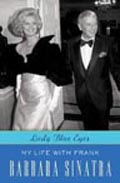 Mrs. Sinatra writes in her memoir that Frank despised the press with the sole exception of former TV host Larry King, novelist Pete Hamill, and the late James Bacon, who wrote a Hollywood column for the Los Angeles Herald-Examiner. No surprise there as each man genuflected to “Ole Blue Eyes.” And there was much to admire in the man—his monumental talent, great showmanship and unparalleled philanthropy. But there was also a dark side, violent and frightening.
Mrs. Sinatra writes in her memoir that Frank despised the press with the sole exception of former TV host Larry King, novelist Pete Hamill, and the late James Bacon, who wrote a Hollywood column for the Los Angeles Herald-Examiner. No surprise there as each man genuflected to “Ole Blue Eyes.” And there was much to admire in the man—his monumental talent, great showmanship and unparalleled philanthropy. But there was also a dark side, violent and frightening.
In researching His Way, I traveled to Hoboken, Manhattan, Hollywood, Las Vegas and Palm Springs to interview Sinatra’s relatives, friends, employees, co-stars, musicians, business associates, directors, producers, and former lovers, most of whom spoke on the record. Yes, there was a long line of women—show girls, call girls, movie stars, manicurists, even the wives of some of his best friends. But aside from his own wives, most of Sinatra’s women were simply there to help him make it through the night.
An exception was Nancy Gundersen, who I knew had played an important part in his life for several years before she became the wife of New York ob-gyn Martin L. Stone, M.D. Ms. Gundersen declined to be interviewed when I called her years ago. So I was surprised a few months ago when she approached me after a speech I had given for the College of the Desert in Rancho Mirage. “It’s been almost 25 years since you called,” she said, “but you can have that interview now, if you’d like.”
We both laughed, made a date for lunch the following week and spent hours comparing notes on the Frank she knew and the Frank I wrote about. Elegant, pretty, and whip smart, she was delightful, and I saw immediately why Sinatra had been so charmed.
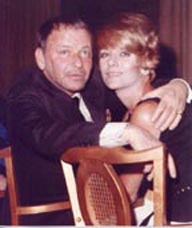
“Frank and I met on a blind date in New York in 1970 when I was the house model for Anne Klein,” she said. “I had had been working on an M.A. in International Relations at the New School before that. He was 23 years older than me but we clicked immediately…. On our first date He gave me his antique Dunhill lighter. Anne wanted me to look great every time I went out with Frank so once she loaned me a gorgeous mink coat. Frank loved the coat and complimented me on it but I told him the truth–that it wasn’t mine, that I had borrowed it for the evening. The next day I found an envelope filled with $100 bills and a note that said: ‘Buy your own mink coat.’ So I did.
“Anne Klein loved our affair and always dressed me when Frank and I went out. One night Frank asked me to go to the theater with Loel and Gloria Guinness. I was too young to know that Gloria Guinness was a renowned beauty and supposedly the most elegant woman in the world but Anne knew what I was up against so she dressed me in a gorgeous white silk dress, cut on the bias, topped by a spectacular orange silk patch work coat that Frank just loved because, as you know, orange was his favorite color.”
Nancy Gundersen Stone recollected sweet times with Sinatra. “We had a wonderful affair for two years that melted into a deep friendship for another two years… I loved Frank, but was never in love with him… I spent many, many week-ends at his house in Palm Springs and I have to laugh as I remember the deep freeze I’d always get from Dinah Shore and the girls who were pushing him to marry Barbara Marx…. He told me Ava had been the great love of his life and that that love almost ruined him. He never got over her—ever.”
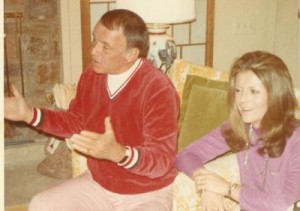
Blessed by good looks, a good education and Anne Klein, Nancy had the cachet (or “class” as Frank Sinatra said) to travel easily in all of his worlds. He flew her to Las Vegas for his shows and to weekend with him at publisher Bennett Cerf’s house in Westchester County. “I was not a show girl,” she said, “so he felt he could introduce me to all sorts of people.”
She also accompanied him to his mother’s house in New Jersey when he signed his record contract. She remembered Dolly Sinatra as “rawhide tough,” but adored by her son. “That night Frank wrote a check for her for $1 million.”
Barbara Sinatra writes in her memoir that Frank never discussed his finances with her. Yet he seems to have shared many such details with Nancy Gundersen. “When he drew up the trust funds for his kids he made sure that Frank, Jr. got his payout at the age of 21 but the girls, Nancy and Tina, could not get their money until they were 35. ‘Otherwise, they’ll marry bums,’ Frank said.”
Nancy Gundersen came to know Frank’s daughters very well, having spent so much time with them at his house in Palm Springs. “One night Frank was receiving an award at Chandler Center and he escorted Nancy Sr. and his daughters. I was driven to the ceremony by Sarge Weiss. It was a bit uncomfortable, especially when Nancy, Jr. pretended not to know me in front of her mother, but Tina, who is like her father, ran over to give me a big hug. Frank and I left right after for Palm Springs.”
Interesting to note that after 22 years of marriage to their father, Barbara Sinatra does not mention either of his daughters in her memoir. Since Frank Sinatra died in 1998, the three women have not spoken, except through lawyers. Their fights are primarily over money, although each was magnificently taken care of in Sinatra’s will. The two daughters have written books suggesting that the blond Las Vegas show girl who became their step-mother was not worthy of their father’s iconic name.
Nancy and Tina Sinatra, both of whom have been married and divorced never took their husbands’ names, preferring instead to go through life as Frank Sinatra’s daughters. And who could fault them? In its day, the Sinatra name could open any door. As Barbara Sinatra writes, she met presidents, prime ministers and potentates. She details the delights of being Lady Blue Eyes (the mansions, the mammoth jewels, the private planes, the famous friends) and the dangers (the violent fights, the black moods, the uncontrollable temper). She also dishes.
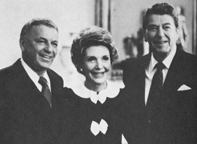 She dismisses former First Lady Nancy Reagan as a user. “[She] was never a close friend, and it had nothing to do with the fact that she seemed to have a crush on my husband…. I felt she took advantage of Frank’s huge heart…. During long distance telephone calls and their lunches together whenever they were in the same town, I think Frank became Nancy’s therapist more than her friend.”
She dismisses former First Lady Nancy Reagan as a user. “[She] was never a close friend, and it had nothing to do with the fact that she seemed to have a crush on my husband…. I felt she took advantage of Frank’s huge heart…. During long distance telephone calls and their lunches together whenever they were in the same town, I think Frank became Nancy’s therapist more than her friend.”
After telling readers that her husband, “Charlie Neat,” was obsessively clean, took three showers a day and allotted $1 million a year to himself to lose at gambling, Barbara Sinatra writes that as his wife it was her job to vet the guest list of every party to which they were invited. If there was a guest that Frank did not like, Frank did not attend. When Henry Kissinger planned a dinner in Frank’s honor, he had to submit the guest list to Barbara. Unfortunately, for Kissinger, he had invited Barbara Walters, whom Sinatra detested, so Sinatra refused to go to the party. Stunned, Kissinger called Barbara Sinatra three times, begging her to get her husband to reconsider, but Sinatra was adamant. Mrs. Sinatra told the former Secretary of State that her husband would not go anywhere Barbara Walters was present. Finally, Kissinger had no choice but to disinvite Walters. Only then would Frank Sinatra agree to attend the party in his honor.
Right, wrong or rude, the man certainly did it His Way.

Photo credits: Nancy Gundersen with Frank Sinatra, courtesy of Nancy Gundersen Stone; Frank Sinatra 1986, Frank Sinatra with the Reagans in 1985, and the author in 1986 used with permission of the Estate of Stanley Tretick.
Cross-posted from Huffington Post
Frank Sinatra and Me
by Kitty Kelley
I can’t say I wasn’t warned. Alarms started clanging the day I signed to write His Way: The Unauthorized Biography of Frank Sinatra (Bantam Books, 1986).
Some friends urged me to buy life insurance and make them the beneficiaries; others recommended bodyguards and a bullet-proof vest. The rumors of Frank Sinatra’s violence and his ties to organized crime were such that journalists joked in print about me ending up in concrete boots and sleeping with the fishes, if I proceeded to write his biography. Milton Berle joshed at the Friars Club, “Kitty Kelley wanted to be here tonight but an hour ago she tried to start her car.”
The laughs stopped when I received a message on my answering machine: “Soy-ving by Oy-ving here. Call ASAP ‘cuz we gotta soyve ya.”
I figured it was a New Jersey caterer who had the wrong number. Turns out it was a process server named Irving in the subpoena business of serving.
“Serving by Irving” was no joke. Frank Sinatra was suing me before I had written a word. In fact, the book was five years away from publication, but Sinatra wanted to make sure it would never be published. So he sued me (not my publisher) in Santa Monica, California, seeking $2 million in punitive damages, saying that he and he alone, or someone that he anointed could write his life story. Anyone else would have to pay $2 million dollars for daring to undertake the enterprise.
Getting sued by one of the most powerful men in the country—and one with mob connections—gets your attention. Fortunately, a national coalition of writers groups rose up to protest, claiming that Sinatra’s lawsuit against me was an assault upon all writers’ constitutionally protected freedoms of expression and should be dismissed on its face. In a joint statement they said: “The apparent goal behind Sinatra’s filing of this suit is to scare Ms. Kelley away from her investigation and, ultimately, to force her to scrap the book. Abuses of the judicial system such as these pose a serious threat to all writers.”
For one year, Sinatra pursued his lawsuit, but his allegations proved groundless, and he finally was forced to drop his case.
The writers groups applauded his action. “The court’s dismissal of this meritless suit—at the request of Mr. Sinatra—is a victory for all writers and the public,” stated their press release. “It reaffirms the right of the public to be informed about the lives of influential public persons whether or not they approve of the writer and his or her approach.”
The Baltimore Sun editorialized on the right to cover public figures without restriction: “If all the public can learn of the person is what the person himself wants it to learn, then our will become a very closed and ignorant society, unable to correct its ills, quite unlike what the drafters and subsequent generations of defenders of the free-speech First Amendment had in mind.”
I continued my work, interviewing Sinatra’s friends, employees, associates, former girl friends and lovers, federal law enforcement agents, plus musicians, movie stars and mobsters like Moe Dalitz, who had known and worked with him over the years. I also interviewed a few Sinatra relatives, including his son, Frank Sinatra, Jr. Through my years of research I received regular calls from Liz Smith, former New York Daily News gossip columnist, with all sorts of Sinatra stories, mostly scurrilous. Yet a few weeks before publication, Sinatra decided to make amends with the woman he demeaned on stage as “a dumpy, fat, ugly broad,” and referred to as “Lez” Smith. He invited her for drinks, she swooned, and Sinatra never had to read another negative word about himself in her columns.
My book was published in 1986 and enjoyed great success, selling over 1 million copies in hardback—a testament to the enduring fascination with Frank Sinatra. However, His Way was not applauded by the singer or his family, for the biography had opened doors that they had long kept locked.
Upon publication Nancy and Tina Sinatra called reporters to denounce the book and its author. Their father railed on television about “pimps and prostitutes” who write “a lot of crap” for money. “We nearly strangled on our pain and anger,” Nancy Sinatra said, reviling me as “the big C-word… I hate [Kitty Kelley]… If I ever met her, I don’t know what I’d do….” She ranted for months on her website and was still ranting years later when she tried to jump-start her career at the age of 54 by posing nude for Playboy. “Don’t ask me any questions about that goddamned Kitty Kelley or her goddamned book,” she warned reporters.
Tina Sinatra claimed that my biography had made her father ill, causing him to undergo major colon surgery in 1986 for seven and a half hours, and to endure a temporary colostomy. Tellingly, she waited until her father had died before she published her own book, which lacerated Barbara Sinatra, her father’s wife of 22 years, as a grasping, gold-digging wench not worthy of the family name. To this day the women speak only through lawyers.
Now that His Way: The Unauthorized Biography of Frank Sinatra is being published in trade paperback the alarms are once again clanging. “Take cover. Prepare for incoming,” warned one friend via e-mail. “Ole Blue Eyes might be gone but his daughters still prowl the forest.”
There is no longer any question about Frank Sinatra’s ties to the Mafia. As if to tease those mob connections, Nancy and Frank Sinatra, Jr. each appeared in different episodes of HBO’s The Sopranos. The producers of the hit series hung Frank Sinatra’s mug shot in Tony Soprano’s office at the Bada Bing. Yes, Ole Blue Eyes was once arrested on a morals charge and jailed for three days. (See pages 7-9 of His Way.) Movie directors continue to license his music as melodic striptease for their gangster films, and his picture inevitably appears in any film about the mafia.
My biography of Frank Sinatra is not paean to his music but rather an illumination of the man behind the music, who once described himself as “an 18-karat manic-depressive who lived a life of violent emotional contradictions with an over-acute capacity for sadness as well as happiness.”
Taking the man at his word I rode the roller coaster, and now a new generation of readers can join me for the ride.
Photo: Kitty Kelley interviewing Frank Sinatra Jr. on January 15, 1983 in his suite at the Hyatt Regency Washington in Washington DC for His Way: The Unauthorized Biography of Frank Sinatra.
Cross-posted from Huffington Post
HIS WAY new edition, December 28, 2010
by admin
Kitty Kelley’s groundbreaking His Way: The Unauthorized Biography of Frank Sinatra has been updated and released in a trade paperback.
#1 New York Times Bestseller
Also available as an ebook.
More on His Way here and here.
Update December 30, 2015: The 2010 Introduction bu Kitty Kelley was published in the New York Social Diary with a personal note by David Patrick Columbia, here.


